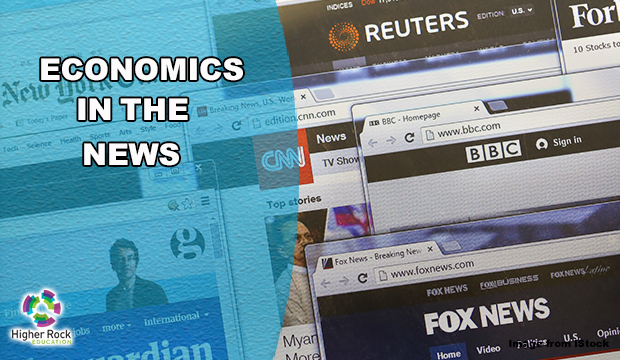
Economics in the News – April 24-30, 2023
Economics impacts our lives every day. Below are some of the top storylines from this past week related to economics.
o Bank regulators seized First Republic Bank and promptly sold all of its deposits and most of its assets to JPMorgan Chase. The 84 branches of First Republic Bank opened Monday morning as branches of JPMorgan Chase, which acquired $92 billion in deposits and $203 billion in loans and other securities. First Republic becomes the second-largest bank failure in United States history and the third midsize bank failure in less than two months. The only larger bank failure in the United States was Washington Mutual in 2008 and was also taken over by JPMorgan.
First Republic Bank catered to wealthy clients and had taken on a number of large, uninsured deposits above the $250,000 threshold set by the FDIC. As the number of deposits at First Republic Bank grew, it used those to fund low interest loans to customers. With the Federal Reserve raising interest rates, the value of those loans decreased. The crisis within the banking industry left those depositors on edge, the wealthy customers lured to First Republic began withdrawing their money at signs of trouble. [Associated Press]o Prescription drugs such as Adderall, Ozempic and others are among those in short supply in the United States. Unexpected demand spikes, manufacturing issues and low ingredient supplies have fueled the shortage. A drug shortage can cause a treatment delay for patients which can impact time-sensitive treatments. The attention-deficit/hyperactivity disorder drug Adderall is facing a manufacturing issue, while diabetes and weight loss drug Ozempic is in short supply after it saw an increase in demand since the summer of 2021.
The generic drug industry faces prevalent shortages but manufacturers have little incentive to solve the shortages due to historic thin profits that they generate. Overall, there are 301 drug shortages in the United States through the year’s first quarter, which is nearly 50 percent higher than 2018. [Associated Press]
o The Federal Reserve blamed its regulation and oversight in the leadup to the March collapse of Silicon Valley Bank. The review from the central bank found that Silicon Valley Bank grew rapidly in size and risk with inadequate intervention from supervisors who either missed or were slow to react to problems.
The report found that Fed supervisors found issues with the bank but did not act quickly enough to address those issues. Silicon Valley Bank had many depositors above the $250,000 insurance limit set by the FDIC. The bank’s leaders made a big bet that interest rates would stay low and that led to big losses. [The New York Times]
o Virtual private networks have become a protection to allow consumers to protect their online personal identity. They hide what you’re looking at and where you’re looking from by routing traffic through an encrypted “tunnel” to other servers around the world. VPNs emerged in the 1990s as a way for corporate employees to work from home. As broadband replaced dial-up internet, VPNs caught on as a security measure among tech companies, banks and hospitals.
They allow privacy and freedom from corporations and governments, or simply to watch your favorite sports team play. But researchers warn that VPNs shouldn’t be seen as a guarantee of privacy. An internet company or a government agency can figure out who is using a VPN based on patterns and leaks. Some VPNs have been caught gathering user data for market research. [Bloomberg]
o The lack of a United States tax treaty with Taiwan means that Taiwanese businesses and individuals in the US are taxed on their income by both governments, creating a “double taxation” problem. The lack of a tax treaty has caused some Taiwanese companies to jump through hoops to minimize their tax burdens.
The 2022 Chips Act created generous incentives to ensure the US has a domestic semiconductor industry healthy enough to compete with China and reduce the reliance of overseas imports from geopolitical vulnerable countries. Meanwhile, China – which considers Taiwan its sovereign territory – is warning the US to cease interaction with Taiwan. [The Wall Street Journal]